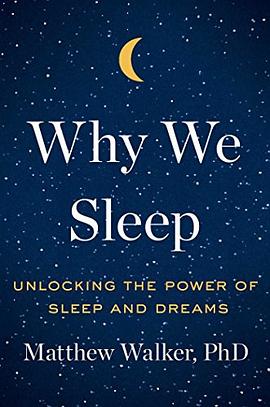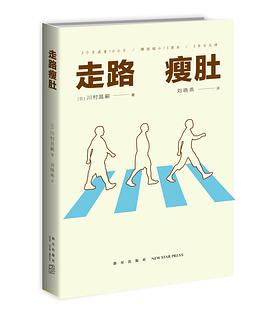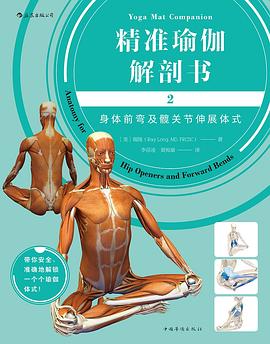

具体描述
The first sleep book by a leading scientific expert—Professor Matthew Walker, Director of UC Berkeley’s Sleep and Neuroimaging Lab—reveals his groundbreaking exploration of sleep, explaining how we can harness its transformative power to change our lives for the better.
Sleep is one of the most important but least understood aspects of our life, wellness, and longevity. Until very recently, science had no answer to the question of why we sleep, or what good it served, or why we suffer such devastating health consequences when we don't sleep. Compared to the other basic drives in life—eating, drinking, and reproducing—the purpose of sleep remained elusive.
An explosion of scientific discoveries in the last twenty years has shed new light on this fundamental aspect of our lives. Now, preeminent neuroscientist and sleep expert Matthew Walker gives us a new understanding of the vital importance of sleep and dreaming. Within the brain, sleep enriches our ability to learn, memorize, and make logical decisions. It recalibrates our emotions, restocks our immune system, fine-tunes our metabolism, and regulates our appetite. Dreaming mollifies painful memories and creates a virtual reality space in which the brain melds past and present knowledge to inspire creativity.
Walker answers important questions about sleep: how do caffeine and alcohol affect sleep? What really happens during REM sleep? Why do our sleep patterns change across a lifetime? How do common sleep aids affect us and can they do long-term damage? Charting cutting-edge scientific breakthroughs, and synthesizing decades of research and clinical practice, Walker explains how we can harness sleep to improve learning, mood, and energy levels; regulate hormones; prevent cancer, Alzheimer’s, and diabetes; slow the effects of aging; increase longevity; enhance the education and lifespan of our children, and boost the efficiency, success, and productivity of our businesses. Clear-eyed, fascinating, and accessible, Why We Sleep is a crucial and illuminating book
作者简介
Matthew Walker is a professor of neuroscience and psychology at UC Berkeley, the Director of its Sleep and Neuroimaging Lab, and a former professor of psychiatry at Harvard University. He has published over 100 scientific studies and has appeared on 60 Minutes, Nova, BBC News, and NPR’s Science Friday. Why We Sleep is his first book.
目录信息
读后感
认真对待睡眠这事 这篇文章写给家人,妈妈今年56了,人生步入中年,睡眠质量越来越重要,从我上高中时,她就说睡不好,可是,我却从没有去研究过更年期妇女的睡眠情况应该如何改善,其实当时完全可以去图书馆去书店去谷歌上找到相应的论文和实践,去改善家庭睡眠质量,可惜,只...
评分The internet never sleeps. but we should not underestimate the power and importance of sleep. why is morning a balm (慰籍something that gives you comfort)to some and a bane (祸根someting that causes trouble or make people unhappy)to others ? it all depends ...
评分The internet never sleeps. but we should not underestimate the power and importance of sleep. why is morning a balm (慰籍something that gives you comfort)to some and a bane (祸根someting that causes trouble or make people unhappy)to others ? it all depends ...
评分 评分这是一本比尔盖茨推荐的书,无意中找到了台版的EPUB文档。如果你仅仅想找一本关于如何快速睡眠技巧的书籍,那这本书并不适合,这是一本略微带有学术味道的书籍。全书分为四个部分,每个部分可以分开独立阅读。 第一部分:睡眠是什么?这一部分主要讲解了关于睡眠的科学解释以及...
用户评价
在我阅读《Why We Sleep》之前,我一直认为睡眠就是简单的“躺下休息”,一个不容商量的、每天必须完成的任务。我曾几何时,将熬夜工作、减少睡眠视为一种“拼搏”的象征,一种对效率的极致追求。然而,这本书,就像一个温柔的警钟,唤醒了我对睡眠的敬畏之心。作者马修·沃克,用他精湛的科学叙述,将睡眠的神秘面纱层层揭开,让我看到了一个前所未有的、充满活力的生命过程。我被书中关于睡眠对我们大脑健康,尤其是对学习、记忆和情绪调节的不可替代的作用深深折服。我了解到,睡眠并非是将白天学到的知识“储存”起来,而是一个主动的“重塑”和“优化”过程,它能够帮助我们清除冗余信息,加强关键连接,从而提升我们的认知能力和创造力。书中对于睡眠不足如何导致情绪不稳定、决策失误以及增加事故风险的描述,让我不寒而栗,我开始反思自己曾经的那些“逞强”行为,原来它们对我的身心健康造成了多么大的损害。作者对影响睡眠的各种因素,如光线、温度、运动、饮食等,进行了详尽的分析,并给出了切实可行的建议。我明白了,想要获得高质量的睡眠,并非是简单的“早睡早起”,而是需要我们从生活的方方面面去调整和优化。这本书让我重新认识到,睡眠不是一种“奢侈”,而是我们生命中最基本、最宝贵的“投资”。
评分这本书,让我重新审视了那些我曾经习以为常,甚至有些忽视的夜晚。在我读《Why We Sleep》之前,睡眠对我来说,更多的是一种“必要之恶”,是完成一天工作后,身体自动启动的“关机”模式。我以为只要睡够时数,身体就能恢复,大脑就能正常运转。但这本书,像一盏明灯,照亮了我对睡眠认知的盲区。它不仅仅是一本关于睡眠的书,更像是一本关于生命、关于健康、关于我们自身潜能的百科全书。作者马修·沃克以其深厚的科学功底和引人入胜的叙述方式,将枯燥的生理学知识转化为一个个生动的故事和令人信服的论据。我惊叹于睡眠在学习、记忆、情绪调节、身体修复,甚至是我们抵御疾病的能力中扮演的如此关键的角色。那些曾经困扰我的“为什么”——为什么我有时会感到精力不济,为什么我的记忆力似乎不如从前,为什么我在压力大的时候情绪会如此不稳定——在读完这本书后,都有了清晰的答案。它让我意识到,睡眠并非是一种被动的休息,而是一个极其活跃、极其复杂的生理过程,它在日复一日地塑造着我们的身心健康。我开始明白,睡眠不足不仅仅是“睡不够”,而是在悄悄地侵蚀着我们的认知功能,削弱我们的免疫系统,甚至增加患上各种慢性疾病的风险。这本书的价值,在于它提供了一种全新的视角来理解我们自身的生理需求,并鼓励我们去做出积极的改变。它让我开始重新评估我自己的睡眠习惯,并促使我去思考,如何才能优化我的睡眠,从而更好地掌控我的健康和生活。
评分《Why We Sleep》这本书,对我来说,是一次关于“自我疗愈”的启蒙。在阅读这本书之前,我一直将身体的小病小痛,归咎于外部因素,比如天气变化、饮食不当等等。我从未曾将“睡眠”这个看似微不足道的因素,与身体的健康状况紧密联系起来。然而,沃克教授的这本书,让我看到了睡眠在身体修复和疾病预防中的强大力量。我被书中关于睡眠如何帮助身体清除代谢废物,修复受损组织,以及增强免疫系统的详细阐述所震撼。我了解到,在我们熟睡的几个小时里,身体正在进行着一场精密的“自我修复”过程,它能够清除大脑中的“有毒”蛋白质,预防阿尔茨海默症的发生,并且能够有效激活我们的免疫细胞,帮助我们抵御感染。那些关于睡眠不足如何削弱身体的自然防御能力,增加患上各种疾病的风险的描述,让我感到一丝寒意。我曾经对自己的睡眠质量并不太在意,认为只要睡够时间就可以了,但这本书让我明白,睡眠的“质量”同样重要,甚至比“数量”更为关键。作者对影响睡眠质量的因素,如光照、温度、噪音等,进行了深入的分析,并给出了切实可行的改善建议。这本书让我认识到,通过优化睡眠,我们可以更好地支持身体的自然疗愈能力,从而提升整体的健康水平。
评分《Why We Sleep》这本书,对我来说,是一次关于“生命的本源”的深刻洞察。我一直认为,人生的意义在于奋斗、在于成就,在于不断地超越自我。然而,这本书却引导我将目光转向生命最基础的层面——睡眠。作者马修·沃克,用他严谨的科学态度和充满魅力的笔触,将睡眠的复杂性和重要性,以一种令人信服的方式展现出来。我被书中关于睡眠在身体修复、免疫增强以及预防疾病方面的强大功能所震撼。我了解到,在我们沉睡的每一个夜晚,我们的身体都在进行着一场精密的“维护”和“修复”工程,它能够清除损伤细胞,合成必需蛋白质,并悄悄地提升我们抵御疾病的能力。那些关于睡眠剥夺如何削弱我们的免疫系统,增加患上癌症、心血管疾病等严重疾病的风险的描述,让我感到警醒。我曾经以为,健康的身体只是源于规律的饮食和适度的运动,但这本书让我明白,充足而优质的睡眠,才是支撑这一切的基石。作者对于睡眠对我们情感健康的影响,尤其是其在处理负面情绪、维持心理平衡方面的作用,也让我受益匪浅。我明白了,为什么在睡眠不足的时候,我们会变得易怒、焦虑,甚至抑郁。这本书让我认识到,睡眠不仅仅是为了让我们在白天有精力去生活,更是为了让我们能够更好地“活”,活得更健康、更快乐、更充实。
评分在我接触《Why We Sleep》这本书之前,我对睡眠的理解,仅仅停留在“身体需要休息”这个层面。我将睡眠视为一种必然的“消耗”和“恢复”的循环,一个在完成白天各项任务后,不得不进行的“低能耗”状态。然而,这本书,彻底改变了我对睡眠的看法,它将睡眠从一个被动的生理反应,提升到了一个主动的、至关重要的生命过程。作者马修·沃克,以他深厚的学术造诣和引人入胜的叙事能力,为我打开了一个全新的世界。我被书中关于睡眠在认知功能,特别是学习、记忆以及决策能力方面的关键作用所折服。我了解到,睡眠不仅仅是巩固白天的记忆,更是大脑在进行“信息分类”和“连接重塑”,它能够帮助我们过滤掉无关紧要的信息,加强有用的知识,从而提升我们的学习效率和创造力。那些关于睡眠剥夺如何导致判断失误、反应迟钝以及注意力不集中,甚至引发严重错误的例子,让我深感警惕。我曾几何时,在工作和学习中,为了挤出时间,而牺牲睡眠,现在回想起来,那是在用“透支健康”的方式来换取短暂的“效率”,其结果往往是得不偿失。这本书让我明白,睡眠不是一种“牺牲”,而是对我们自身最有价值的“投资”。
评分当我翻开《Why We Sleep》这本书时,我并没有抱有太高的期望,我以为这不过又是一本关于如何“高效睡眠”的指导手册,教我一些速成的技巧,让我能够在短暂的时间里获得“高质量”的休息。然而,这本书带给我的震撼,远远超出了我的想象。它并非简单地罗列睡眠技巧,而是深入浅出地剖析了睡眠的本质,揭示了睡眠对我们生理和心理健康的深远影响。作者以极其严谨的科学态度,引用了大量的研究数据和临床案例,将睡眠的复杂性展现得淋漓尽致。我被那些关于REM睡眠(快速眼动睡眠)和NREM睡眠(非快速眼动睡眠)的详细阐述所吸引,了解到它们各自在巩固记忆、处理情感、清除大脑代谢废物等方面所发挥的独特作用。这本书让我第一次意识到,睡眠不仅仅是身体的休息,更是大脑进行“维护”和“优化”的关键时期。我开始理解,为什么在考试前熬夜复习的效果往往适得其反,为什么在经历了情感创伤后,充足的睡眠能够帮助我们更好地走出阴影。作者对于咖啡因、酒精、褪黑素等常见物质对睡眠影响的分析,也让我对自己平时的生活习惯有了更深刻的认识。我曾经对这些物质的依赖,以及它们对我睡眠质量的潜在损害,一直被我忽视。现在,我明白了,要想真正拥有健康,就必须从最基础的睡眠做起。这本书的叙述方式也非常巧妙,它不是枯燥的说教,而是通过一个个引人入胜的故事,将科学的理念融入其中,让我在阅读的过程中,仿佛置身于一个生动的科学课堂。
评分《Why We Sleep》这本书,对我而言,是一次关于“潜能开发”的全新启发。在此之前,我一直认为,提升学习效率、提高工作表现,主要依靠的是“努力”和“方法”。我从未将“睡眠”这个看似被动的生理过程,与“潜能开发”联系起来。然而,沃克教授的这本书,让我看到了睡眠在释放我们内在潜能方面的巨大作用。我被书中关于睡眠在学习、记忆以及创造力方面的关键角色所震撼。我了解到,睡眠并非只是简单地“巩固”白天所学,而是大脑在进行“信息整合”、“模式识别”以及“创新连接”的过程。REM睡眠,那个充满奇思妙想的阶段,更是我们大脑进行“跳跃性思维”,从而产生新想法的关键时期。那些关于睡眠剥夺如何抑制我们的学习能力,扼杀我们的创造力,甚至让我们无法有效解决问题的例子,让我深感警醒。我曾几何时,为了完成任务而牺牲睡眠,现在回想起来,那是在“扼杀”自己的潜能,是在用一种低效的方式来追求所谓的“成就”。这本书让我明白,想要真正地释放我们的潜能,就必须给予我们的身体和大脑充足的、高质量的睡眠。它让我认识到,睡眠不是一种“负担”,而是通往更高效、更有创造力的自己的“钥匙”。
评分在我翻开《Why We Sleep》之前,我一直认为,“精力充沛”是衡量睡眠好坏的唯一标准。我以为只要白天不感到困倦,就说明我的睡眠是足够的,是健康的。然而,这本书,就像一面镜子,照出了我认知上的盲点,让我看到了睡眠背后更深层次的意义。作者马修·沃克,以他严谨的科学研究和引人入胜的写作风格,为我描绘了一个我从未想象过的、睡眠的世界。我被书中关于睡眠对我们情绪和心理健康的关键作用所深深吸引。我了解到,睡眠不仅仅是让我们在白天保持清醒,更是我们处理和调节情绪的重要通道。REM睡眠,那个充满梦境的阶段,竟然是我们在夜间“排解”负面情绪,从而保持心理平衡的关键。那些关于睡眠剥夺如何导致情绪波动,增加焦虑和抑郁风险的例子,让我不寒而栗。我开始反思自己曾经的那些“情绪爆发”,原来它们很可能与我糟糕的睡眠习惯有关。这本书让我明白,想要拥有健康的情绪,就必须从关注和改善我们的睡眠做起。它不仅仅是一本关于睡眠的书,更是一本关于如何更好地管理我们情绪,如何更深刻地理解我们自身心理的书。
评分《Why We Sleep》这本书,对我而言,是一次关于“自我认知”的深度探索。在此之前,我一直将睡眠视为身体的“充电”过程,一个在白天消耗过度后,必不可少的“停机”时间。我对它的关注点,也仅限于“睡够几个小时”。然而,沃克教授的这本书,彻底颠覆了我对睡眠的固有认知。他用无可辩驳的科学证据,向我展示了一个我从未曾想象过的、睡眠世界。我被书中关于睡眠在人类进化过程中所扮演的角色所震撼,了解到睡眠并非是一种“浪费”时间,而是一种深刻的生物学需要,它帮助我们更好地适应环境,提升生存能力。我尤其对书中关于不同年龄段人群睡眠需求的差异,以及睡眠模式随着年龄增长而发生的变化的描述印象深刻。这让我能够更好地理解自己和家人的睡眠状况,并做出更具针对性的调整。书中对睡眠剥夺对身体健康的长期影响,比如增加患糖尿病、心脏病、阿尔茨海默症等疾病的风险,让我感到警醒。我曾经以为这些疾病离我遥远,但这本书让我明白,不良的睡眠习惯,正在悄无声息地为这些疾病埋下隐患。作者的叙述风格非常引人入胜,他将复杂的科学原理,用生动形象的语言,结合生活中的实例,娓娓道来,让我阅读起来毫无压力,反而充满求知的乐趣。这本书让我明白,想要获得真正的健康和幸福,就必须正视睡眠的重要性,并将其纳入我们生活的核心考量之中。
评分在合上《Why We Sleep》的最后一页时,我的脑海中涌现的不是如释重负的轻松,而是一种深深的敬畏感。这本书,它不是一本简单的“读物”,而更像是一份对我们每个人都至关重要的“生命指南”。我一直以为,自己已经足够了解睡眠了,毕竟,我们每天都在经历。但这本书,却像一把钥匙,打开了我认知睡眠的另一扇大门。作者马修·沃克,用他那充满智慧和激情的笔触,将睡眠的科学研究成果,以一种极其易于理解的方式呈现给了我们。我被书中关于睡眠对学习和记忆的阐述深深吸引,了解到睡眠不仅仅是巩固白天所学知识,更是为我们的大脑构建新的连接,提升创造力的重要环节。那些关于睡眠剥夺如何损害我们的决策能力、反应速度以及情绪稳定性的描述,让我不寒而栗。我开始反思自己生活中那些因睡眠不足而出现的种种“小问题”,原来它们并非偶然,而是身体在发出无声的抗议。书中对失眠的成因和治疗方法的探讨,也给我带来了新的希望。它不仅仅提供了技术性的建议,更重要的是,它让我们认识到,对待睡眠,需要的是一种尊重和理解,而不是一味的征服和压制。这本书让我明白了,睡眠不是奢侈品,而是我们生存和发展的必需品。它让我开始重新审视我的工作方式、生活节奏,以及我对自身健康的责任。这本书的价值,在于它能够引发我们深刻的自我反思,并激发我们去做出持久而积极的改变。
评分https://peterattiamd.com/matthewwalker1/ 作者聊了总共三期的Podcast
评分也许并不是动物进化出了睡觉这件事,而是动物最原始的状态就是睡眠状态,进化让动物能周期性地“醒过来”If sleep does not serve an absolutely vital function, then it is the biggest mistake the evolutionary process has ever made. Wake: reception,NREM: reflection (storing&strengthening raw ingredients), REM: integration (interconnecting,building a more accurate model, innovative insights&problem-solving
评分《Why We Sleep》的作者是一位名叫Matthew Waler的睡眠学专家,看完了这本书,才明白「晚上睡不好」带来的问题,绝对不仅仅是「白天很疲倦」,而是非常非常可怕的各种智力低下、生理疾病、心理障碍、性格缺陷,甚至有生命危险。关键这些结论都不是凭空臆造,而是经过二十多年无数例的科学试验得出的。 睡眠比饮食和运动更重要。如果剥夺一个人睡眠、或食物、或运动24小时,睡眠伤害最大;每晚睡少于6小时的45岁以上的人,比睡7-8小时的人得心梗和脑梗的概率高200%。睡眠不足会变傻,容易得老年痴呆症。 虽然看似老生常谈,但睡眠这个看似日常的小事情,却是事关性命的大事情。睡的好是福气,睡不好是自己不够重视。睡眠,才是人生正经事,是生命最好的修行。规律作息,早睡早起,持之以恒,受益终生!
评分https://peterattiamd.com/matthewwalker1/ 作者聊了总共三期的Podcast
评分作为一个以研究睡眠为生的人,我最开始觉得,写睡眠的科普书对我还有什么新意?故而虽然早在一年前就听过作者的新鲜空气访谈,还是没有找来看。但真正听完了全书,却意外地发现自己学到很多新东西,也许是因为背景知识储备比较充分,所以新东西容易吸收,但同时确实也是因为作者写得清楚有条理,而且在很多地方,尤其是睡眠在进化中的作用、以及睡眠的神经机制方面有很多独到见解。总之非常推荐。
相关图书
本站所有内容均为互联网搜索引擎提供的公开搜索信息,本站不存储任何数据与内容,任何内容与数据均与本站无关,如有需要请联系相关搜索引擎包括但不限于百度,google,bing,sogou 等
© 2026 book.wenda123.org All Rights Reserved. 图书目录大全 版权所有




















